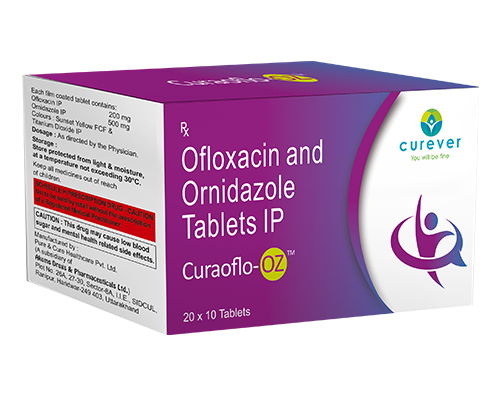•It is important to tell your doctor or pharmacist what medicines you are already taking, including those bought without a prescription and herbal medicines, before you start treatment with this medicine. Similarly, check with your doctor or pharmacist before taking any new medicines while taking this one, to ensure that the combination is safe.
The following medicines may reduce the absorption of ofloxacin from the gut, which could make it less effective. If you are taking medicines containing any of the following ingredients they should be taken at least two hours before or after your ofloxacin dose:
• antacids for indigestion or heartburn
• iron supplements, eg ferrous sulphate, ferrous gluconate, ferrous fumarate
• medicines containing magnesium, aluminium, zinc or iron
• sucralfate
• Videx chewable/dispersible tablets (these contain an antacid)
• zinc supplements.
• Strontium ranelate may also reduce the absorption of ofloxacin from the gut and could make it less effective. If you are taking strontium for osteoporosis its manufacturer recommends that you stop taking it temporarily while you are taking a course of ofloxacin.
If ofloxacin is used in combination with any of the following medicines there may be an increased risk of seizures (fits):
• theophylline
• non-steroidal anti-inflammatory drugs (NSAIDs) such as indometacin, fenbufen, naproxen.
• Ofloxacin may enhance the anti-blood-clotting effect of anticoagulant medicines such as warfarin. As this may increase the risk of bleeding, your blood clotting time (INR) should be monitored more frequently if you are taking ofloxacin with an anticoagulant.
There may be an increased chance of abnormal heart rhythms ('prolonged QT interval' on a heart monitoring trace or ECG) if this medicine is taken in combination with other medicines that can increase the risk of this, for example those listed below:
• atomoxetine
• medicines to treat abnormal heart rhythms (antiarrhythmics), eg amiodarone, procainamide, quinidine, disopyramide, sotalol
• the antihistamines astemizole, terfenadine or mizolastine
• certain antipsychotics, eg thioridazine, chlorpromazine, sertindole, haloperidol, pimozide
• certain antimalarials, eg halofantrine, chloroquine, quinine, Riamet, mefloquine
• certain antimicrobials, eg erythromycin, clarithromycin, voriconazole, moxifloxacin or pentamidine
• cisapride.
• Oral typhoid vaccine (Vivotif) should not be taken until at least three days after you have finished a course of this antibiotic, because the antibiotic could make the vaccine less effective.
In the past, women using hormonal contraception such as the pill or patch would be advised to use an extra method of contraception (eg condoms) while having treatment with an antibiotic like this one and for seven days after finishing the course. However, this advice has now changed. You no longer need to use an extra method of contraception with the pill, patch or vaginal ring while you have a course of antibiotics. This change in advice comes because to date there is no evidence to prove that antibiotics (other than rifampicin or rifabutin) affect these contraceptives. This is the latest guidance from the Faculty of Sexual & Reproductive Healthcare.
However, if you are taking the contraceptive pill and experience vomiting or diarrhoea as a result of treatment with this antibiotic, you should follow the instructions for vomiting and diarrhoea described in the leaflet provided with your pills.
